- Home
- Jojo Moyes
The Peacock Emporium Page 16
The Peacock Emporium Read online
Page 16
Alejandro asked himself several times, afterwards: How could I have told him then?
Jorge de Marenas was going to pop into his office before going home. The traffic headed out to the Zona Norte was always terrible at this time, and since the trouble had started, even a man like Jorge didn't feel safe sitting in a jam.
'Luis Casiro got his new Mercedes stolen, did I tell you? Didn't even have time to get his gun from his jacket before they had pulled him out. Hit him so hard he needed fourteen stitches.' Jorge shook his head, gazing out at the traffic around him. 'Fernando de la Rua has a lot to answer for.'
To the right, through the smoked-glass window, Alejandro could see the Mothers of the Plaza de Mayo, their headscarves white against the greenery around them, embroidered with the names of the Disappeared. Their apparently peaceful demeanour was deceptive, belying the thousands of photographs that had decorated the park for over twenty years: sons, daughters, whose murderers, each knew, might have passed them in the street. The economic downturn had not deterred them, but it had given the rest of the city's inhabitants a new focus, and they looked tired and ignored, upholders of yesterday's news.
Alejandro thought briefly of the girl baby he had delivered almost three months ago, those he had seen handed over subsequently, their births christened with tears, then pushed the thought from his mind. 'Pa?'
'Don't tell your mother how much we had to drink last night. My head is sore enough as it is.' His father's voice still carried the satisfaction of the catch. Beside them, a colectivo, visibly belching diesel fumes, slowed to four or five m.p.h., just slow enough for its departing passengers to hit the pavement running, while those waiting launched themselves on board. One man, tripping and failing, yelled and shook his fist at the departing bus.
'I think she is going through the change,' his father said, meditatively. 'Women often become irrational then.'
'I need to talk to you.'
'She's got so paranoid about security she will hardly leave the house. She won't own up to this, of course. Not even if you ask her. She will make excuses, say the ladies are coming round for her charity works, or it's too hot to go out today, but she's no longer leaving the house.' He paused, still cheerful. 'And she's driving me mad.' The size of the fish had made him garrulous. 'Because she's not going out, she's dwelling on things, you know? Not just the economic situation. Not just the security situation, which I grant you is bad. You know you're more likely to be mugged in the Zona Norte now than in the slums? The bastards know where the money is, they're not stupid.' Jorge exhaled, his eyes still fixed on the road ahead. 'No, she's become obsessed about where I am. Why am I ten minutes late back from the office? Didn't I know that she feared I'd had an accident?'
He glanced in the mirror, unconsciously checking that the coolbox containing the fish had not tipped over. 'I think she thinks I'm having an affair. Whenever she asks me why I'm late, she immediately asks about Agostina. Agostina! Like she's going to give a second glance to an old man like me!' He said it with the confidence of someone who didn't truly believe his own comments.
Alejandro's heart was heavy. 'Pa, I'm going abroad.'
'Everything is magnified, you know? Because she has too much time to sit and think. She has always been the same.'
'To England. I'm going to England. To work in a hospital.'
Jorge had definitely heard him now. There was a lengthy silence, not sufficiently interrupted by the traffic reports on the radio. Alejandro sat in the leather seat, his breath held against the coming storm. Eventually, when he could bear it no longer, he spoke quietly: 'It's not something I planned . . .' He had suspected it would be like this, but still felt unprepared for the weight of guilt that had settled upon him, for the explanations, apologies, that were already begging to be spoken. He stared at his hands, blistered and criss-crossed an angry red from the nylon lines.
His father waited until the traffic report was finished. 'Well . . . I think it's a good thing.'
'What?'
'There is nothing for you here, Ale. Nothing. It is better you go and enjoy life somewhere else.' His head sank into his shoulders, and he exhaled in a long, weary sigh.
'You don't mind?'
'It's not a question - you're a young man. It is right that you travel. It is right that you have some opportunities, meet some people. God knows, there's nothing in Argentina.' He glanced sideways, and the look was not lost on his son. 'You need to live a little.'
The words that sprang to Alejandro's mind seemed inadequate so he closed his mouth on them.
'When are you going to talk to your mother?'
'Today. I got the papers through last week. I want to go as soon as possible.'
'It's just . . . it's just the economic situation, right? There's nothing . . . nothing else that makes you want to leave?'
Alejandro knew that another conversation was hovering between them. 'Pa, the state hospitals are on their knees. There are rumours that they don't have enough money to pay us by the end of the year.'
His father seemed relieved. 'I won't go to the office. You need to talk to your mother. I'll drive you.'
'She's going to be bad, uh?'
'We'll deal with it,' his father said simply.
They traversed the three sides of the square and sat in traffic before the government buildings. His father placed a hand paternally on his leg. 'So, who is going to help me hunt peacock bass, eh?' The unforced animation of before was gone. His father's professional mask was back in place, benign, reassuring.
'Come to England, Pa. We'll hunt salmon.'
'Huh. A child's fish.' It was said without resentment.
The Mothers of the Disappeared were ending their weekly march. As the car began to head back, Alejandro watched them as they folded their laminated posters carefully into handbags, adjusted embroidered headscarves, exchanged greetings and held each other with the loose affection of long-standing allies before they headed for the gates and their lonely journeys home.
The Marenas house, like many in the Zona Norte, looked like neither the flat-fronted, Spanish-influenced shuttered manses of central BA, nor a modern glass-and-concrete structure. It was a curious, ornate building set back from the street and, in architectural style, most closely resembled a Swiss cuckoo clock.
Around it, carefully manicured borders fringed sculpted hedges, which disguised the electric gate, the newly installed bars on the windows, and hid from immediate view the security booth and guard at the end of the road. Inside, the wooden floors had long given way to shining expanses of cool marble, upon which sat expensive French rococo-style furniture, polished and gilded to within an inch of its life. It was not a comfortable-looking house, but while the front rooms spoke of a cool social superiority, inviting guests to admire rather than relax, the kitchen, where the family spent most of their private time, still housed a battered old kitchen table and several shabbily comfortable chairs. Their disappearance, Milagros, the maid, had sworn, would mean the immediate end of her twenty-seven-year tenure with the family. If they thought that after a hard day's cleaning she was going to squeeze her backside into one of those modern plasticky things, they had another think coming. As it was widely agreed that Milagros was often the only thing standing between Alejandro's mother and the sanatorium, the chairs stayed, to the unspoken satisfaction of all parties. And the kitchen remained the most used room in the seven-bedroom house.
It was here that Ale chose to speak to his mother, while his father supposedly busied himself in his study, and Milagros shuffled backwards and forwards across the marble floors with a mop to eavesdrop on the conversation and make the occasional pertinent exclamation. His mother sat upright at the table. With her helmet of blonde hair, she was unrecognisable as the dark-haired beauty of the wedding photographs in gilt frames that littered the house.
'You are going where?' she said, for the second time.
'England.'
'To train? You have changed your mind? You're going to be a doctor?
'
'No, Mother, I'm still going to be a midwife.'
'You're going to work in a private hospital? To advance your career?'
'No. Another state hospital.'
Milagros had stopped all pretence of cleaning, and stood still in the centre of the room to listen.
'You are going to the other side of the world to do the same job that you do here?'
He nodded.
'But why there? Why so far?'
His answers had been rehearsed so many times in his head. 'There are no opportunities here. They are offering good jobs in England, proper wages. I can work in some of the best hospitals.'
'But you can work here!' There was a rising note in his mother's voice that spoke of panic or hysteria. 'Is it not enough that I lose one child? Must I lose two?'
He had known it was coming but that did not make the blow any lighter. He felt the vaguely malevolent presence that he always did when Estela was discussed. 'You're not losing me, Mother.' His voice was that of a doctor speaking to his patient.
'You're moving ten thousand miles away! How is that not losing you? Why are you moving so far away from me?' She appealed to Milagros, who shook her head in sorrowful agreement.
'I'm not moving from you.'
'But why not America? Why not Paraguay? Brazil? Why not Argentina, for heaven's sake?'
He tried to explain how English hospitals were short of midwives, how those from other countries were being offered substantial financial rewards to fill the gap. He tried to tell her that it would be good for his career, that he might end up working for one of the famous teaching hospitals, how the neo-natal care was among the best in the world. She was always going on about their European ancestors - it would be good for him to experience Europe.
He considered telling her of the three babies he had watched handed over at birth because Argentina's economic collapse meant their parents were too poor to keep them, of the anguished cries of the still-bloodied mothers, the painfully set j aws of the fathers. Of the fact that while he had chosen to work with the city's dirt poor, to witness the mind-numbing misery that occurs when poverty and disease grasp hands, nothing had prepared him for the lingering sorrow, the sense of unwilling complicity he felt at the handing over of those children.
But he and his father did not talk to her of babies. They never had.
He knelt and took her hand. 'What is there left for me here, Mama? The hospitals are dying. I could not afford to live in a slum on my salary. You want me to live with you until I am an old man?' He regretted the words as soon as he had spoken them, knowing she would be perfectly happy with such an arrangement.
'I knew you doing this - this thing would bring us no good.'
When he had initially gone into medicine, his mother had been proud. What professions were of a higher status in Buenos Aires, after all? Only plastic surgeons and psychoanalysts, and there were one of each in the family already. Then, two years in, he had returned home to announce a change in career: he was not at home among the doctors, he had realised. His future lay elsewhere. He was going, he said, to work in obstetric care.
'You're going to be an obstetrician?' his mother had said, faint concern creasing her brow.
'No, I'm going to be a midwife.'
It was only the second time Milagros had seen her mistress faint clean away. (The first was when they told her Estela had died.) It was not a suitable profession for the son of Buenos Aires' most prominent cosmetic surgeon whatever he thought his so-called calling was. It was no profession for a red-blooded man, no matter what was said about equality and sexual liberation these days. It certainly wasn't the kind of thing she felt comfortable discussing with her friends, to whom her son was only ever described as being 'in medicine'. It wasn't seemly. More importantly, she believed it might be, she confided to Milagros, the real reason why her beautiful son never brought girls home, why he didn't seem to display the arrogant machismo that should have been shot through the first-born son of such a family. His male instincts, she confided to the maid, had been corrupted by repeated exposure to the more brutal side of feminine biology. Then, even worse, he had chosen to work in the state hospital.
'So, when are you thinking of going?'
'Next week. Tuesday.'
'Next week? Next week coming? Why so much hurry?'
'They need staff immediately, Mama. One has to take opportunities when they come.'
Shock had made her rigid. She held a hand to her face, then crumpled. 'If it had been your sister who wanted this profession, who wanted to move continents . . . that I could have coped with. But you . . . It's not right, Ale.'
So what is right? he wanted to ask. Isn't it right that I have chosen to spend my life bringing children safely into an unsafe world? Isn't it right that my professional currency is in emotion, real life, real love when the whole country in which we are living is built on secrets, and celebrates what is false? Is it right that, no matter what you choose to believe, the second most common surgical procedure my esteemed father carries out is supposedly to make a woman's most private parts more 'beautiful'? As always, he said nothing. Alejandro closed his eyes, and braced himself against his mother's hurt. 'I'll be able to come back, two, maybe three times a year.'
'My only son will be a visitor to my house. This is supposed to make me happy?' She didn't look at Alejandro but appealed to Milagros, who sucked her teeth. There was a lengthy silence. Then, as he had expected, his mother broke into a noisy burst of sobbing. She reached a hand across to him, her fingers waving vainly in the air. 'Don't go, Ale. I promise I won't mind where you work. You can stay at the Hospital de Clinicas. I won't say a thing.'
'Mama--'
'Please!'
She heard the certainty in his silence, and when she next spoke her voice held an edge of bitterness. She blinked against the tears. 'All I wanted was to watch you succeed, get married, look after your children. And now you don't just deny me this, you would deny me yourself!'
Their impending separation made him generous. He knelt and held her hand, her jewelled rings cold against his skin. 'I will come back. I thought you might see this as an opportunity for me.'
She frowned at him, pushed his hair back from his eyes. 'You are so cold, Ale. So unfeeling. Can't you see that you're breaking my heart?'
Alejandro was unable, as ever, to answer his mother's forceful logic. 'Be glad for me, Mama.'
'How can I be glad for you when I am grieving for myself?'
And that is why I am escaping from you, he said silently. Because all I have ever known from you is grieving. Because my head is full of it, always has been. And this way, finally, I might get a little peace. 'We'll talk later. I have to go out now.' He smiled, the patient, detached smile he reserved for his mother, and left her, with a kiss to her brow, sobbing quietly in the arms of her maid.
Considering that their sole purpose was to facilitate sexual excess and impropriety, the Venus Love Hotel, like other such establishments, was excessively bound up in rules and regulations. While any number of sexual aids might be ordered along with the room-service menu, and any kind of debauched proclivity catered for on the many adult videos available for private hire, the hotel was curiously prudish when it came to maintaining its code of conduct, its air of respectability. The building had the sober facade of a private house; its name was not even advertised on a hoarding outside. Neither man nor woman was allowed to wait in a room alone, despite the inconvenience caused to illicit couples forced to rendezvous in nearby cafes, not so safe from prying eyes. A smoked-glass screen at Reception meant that neither receptionist nor visitor could accurately gauge the identity of the other.
Except that one particular customer was known to the man behind the screen now, had paid him generously on more than one occasion to ensure discretion. This customer had appeared in the gossip magazines enough times to be recognisable even from behind the twin barriers of smoked glass and sunglasses.
This meant that, with only a nod to the
silhouette before him, Alejandro was able to skip up the stairs two or three at a time and, at the appointed hour, knock on the discreetly numbered door that had been a private haven two or three times a week for almost eighteen months.
'Ale?' Never anything romantic. Never anything like amor. He preferred it like that.
'It's me.'
Eduardo Guichane was one of Argentina's highest paid television hosts. On his chat show, which aired several times a week, he was flanked by several near-naked South American girls who made frequent, badly scripted references to his legendary sexual appetite. He was tall, dark, immaculately dressed, and prided himself on a physique seemingly unchanged since his years of playing professional football. Argentina's favourite gossip magazine - Gente - repeatedly featured 'stolen' pictures of him squiring some young woman who was not Sofia Guichane, or speculating as to whether, as was the case with his previous wives, he was being unfaithful to the former Miss Venezuela finalist. All planted by his publicist. 'All lies,' Sofia would mutter bitterly, lighting one of her omnipresent cigarettes. Eduardo had the libido of an armchair. Although his most frequent excuse had been exhaustion, she was wondering if his interests didn't lie in other directions.
'Boys?' said Alejandro, cautiously.
'No! Boys I could cope with.' Sofia blew smoke at the ceiling. 'I am afraid he is more interested in golf.'
They had met at his father's surgery on a day after rioting when Alejandro had come, at his mother's request, to check that his father had made it to work safely. Sofia was on one of several visits: having been celibate for four of the six years of her marriage, she had laboured under the belief that a smaller, higher backside and several inches off her thighs might reignite her husband's passion. ('What a waste of American dollars that was,' she said afterwards.) Alejandro, struck by her beauty and by the shining dissatisfaction in her face, had found himself staring, and then, leaving, thought no more of her. But she had bumped into him in the foyer downstairs where, staring at him with the same curious hunger, she announced that she never normally did this sort of thing, then scribbled her number on a card and thrust it at him.

 Me Before You
Me Before You After You
After You The Last Letter From Your Lover
The Last Letter From Your Lover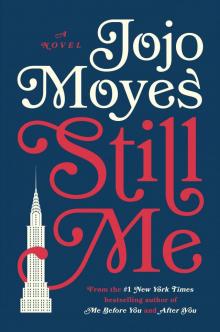 Still Me
Still Me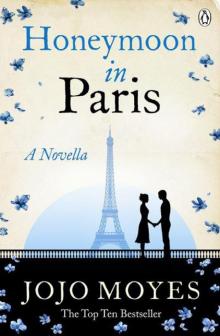 Honeymoon in Paris
Honeymoon in Paris Night Music
Night Music The Girl You Left Behind
The Girl You Left Behind Windfallen
Windfallen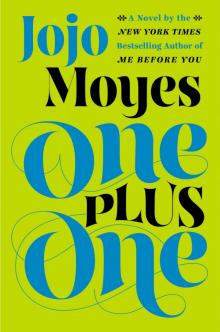 One Plus One
One Plus One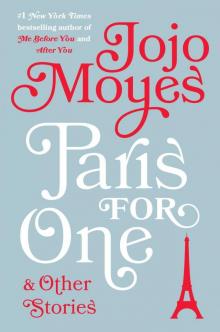 Paris for One and Other Stories
Paris for One and Other Stories The Giver of Stars
The Giver of Stars The Ship of Brides
The Ship of Brides The Peacock Emporium
The Peacock Emporium Silver Bay
Silver Bay The Horse Dancer
The Horse Dancer Peacock Emporium
Peacock Emporium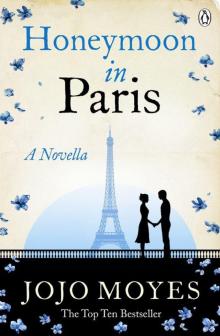 Honeymoon in Paris: A Novella
Honeymoon in Paris: A Novella Ship of Brides
Ship of Brides Paris For One (Quick Reads)
Paris For One (Quick Reads)